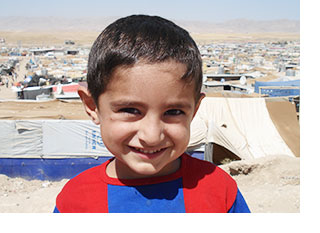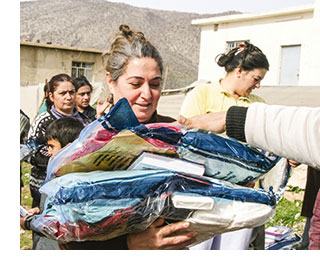Bringing the Word of Life to Vietnam
 May 15, 2014
May 15, 2014
 |
A ministry in Vietnam has translated the Bible into several tribal
languages and plans to make the New Testament available to 20 more
ethnic groups during the next six years.
|
“If you will not leave your faith, stab me now with this knife!”
Mr. K.
* could not believe the village leader’s request. His palms sweated, holding the blade the elder had shoved toward him.
“We are friends. I could never commit such a terrible act,” Mr. K. replied.
The elder grew more incensed. “By worshiping the god of the
foreigners, you have already brought judgment upon everyone in this
village,” he said. “It is better for me to die now than to face the
wrath of the people and the spirits.”
Mr. K. did not know what to do. Two months ago he had joyfully
committed his life to Jesus Christ. People in his Hmong tribal village
assumed he had lost his mind. The greatest insult, however, occurred
when Mr. K. and his family removed the altar from their home. He told
relatives he would no longer offer animal sacrifices to their ancestors.
Most people went out of their way to avoid him. Few visitors stopped
by his home. Now a friend he held in high esteem was practically begging
Mr. K. to kill him.
Knowing this incident would not be the last, Mr. K. hastily walked
away. A short time later village officials and a contingent of border
police showed up at Mr. K.’s house. Unlike the confrontation with his
friend, this request demanded an immediate, inescapable response.
“You have stirred up fear and conflict among the people,” they stated. “Either leave your new faith or leave the village.”
The decision was plain to Mr. K. He gathered his family and left the
village. They found refuge in a field he owned in the nearby hills. No
one would bother them there.
After Mr. K. fled the village, one resident walked into his abandoned
house and set up a new altar. The Hmong villagers sacrificed a chicken,
convinced they needed to make penance to their ancestors for Mr. K.’s
perceived misdeeds.
Reaching Vietnam’s unreached tribes
Sadly, this northern Vietnam village’s response to one of their own
coming to faith in Jesus reflects long-held attitudes of suspicion and
ambivalence toward Christianity. At least local authorities gave Mr. K.
and his family the option of re-settling elsewhere. In other similar
instances, the new believer might have been arrested, severely beaten,
or even killed because he or she has allegedly transferred allegiance to
Christ.
“In Vietnam today, persecution is more of an issue among the
reclusive tribes in the mountains than it is in the major cities,” said
Stephen Van Valkenburg, the Southeast Asia area director for Christian
Aid Mission. “They believe that Christianity is a religion from America,
and they have been taught to view anything American as a threat.”
 |
Despite persecution, more Hmong churches are springing up and flourishing in Vietnam’s northern highlands.
|
While the communist government has succeeded in creating a climate of
national distrust toward “foreign religions,” it is ironic, perhaps,
that some of the country’s most disenfranchised ethnic groups are the
ones experiencing the most rapid move toward Christianity.
The Hmong are one of the largest of the 54 minority people groups
scattered throughout Vietnam. Predominantly found in the northern
highlands, they barely scrape out a living cultivating “dry” rice and
corn on cleared patches of forest. In the most remote villages these
hardy mountain people remain resistant to outside influences,
celebrating their culture and practicing animist religious beliefs much
the same as their ancestors did hundreds of years ago.
There were almost no Christians among the Hmong in the late 1980s,
according to Operation World. Western missionaries were kicked out of
the country in 1975, leaving indigenous believers in Vietnam with the
primary responsibility to spread the good news of Jesus Christ to their
people.
Today there are an estimated 400,000 Hmong believers in Vietnam.
Those numbers continue to grow as Hmong gospel workers make great
strides to form house fellowships in some of the most isolated mountain
settlements.
Other minorities are experiencing a similar openness to God’s good
news, but there remain 22 ethnic groups who do not have any known
followers of Christ.
Christian Aid Mission assists four Vietnamese ministries that are
sending workers to share the Father’s love with several under-reached
and unreached tribes. Getting to these villages is half the battle, as
missionaries travel by motorbike, bicycle, or even on foot to provide
spiritual nurturing and plant churches.
Once a small fellowship becomes established, the need arises for
Christian literature such as Bibles, discipleship materials, and hymn
books.
The process is not as simple as purchasing Bibles and distributing
them to these rural areas. First the Bibles must be translated into the
local language.
During the next six years, one ministry is planning to translate the
New Testament into more than 20 languages. They already have New
Testament translations for 14 other groups.
This same organization has also translated the Old Testament into
seven languages and plans to do the same for 11 more ethnic groups.
In 2014 they would like to print 1,000 copies of the Old Testament in
the Hmong language and another 1,000 copies in the Mnong language. Each
copy costs approximately $8.
The ministry leader reported they have missionaries serving among the
Tho people (pop. 68,000), Giay people (pop. 40,000), Khang people (pop.
10,000), Bo Y people (1,800 pop.), and the Brau people (pop. 400). They
also would like to send pastors to lead house churches attended by
Vietnamese groups living in Laos and Cambodia.
Suffering for Christ’s sake
According to the 2014 World Watch List, Vietnam ranks 18th among
countries that most persecute Christians. That’s three spots above last
year’s ranking.
Government laws passed in 2004-2005 and in 2013 have granted
religious groups the right to legally register. The situation is
certainly an improvement from a decade ago when there was a major
crackdown on house churches. Hundreds of pastors were seized and jailed.
Many vanished, never to be heard from again.
The Evangelical Church of Vietnam (north and south divisions) has
been formally recognized by the government, as have other, smaller
denominations. However, in reality, most churches that apply for
registration are denied the status or must adhere to strict regulations.
Unregistered fellowships face harassment and forced shutdown by the
government.
Persecution is worse for minority groups like the Hmong. Because of
strong anti-Western sentiment, isolated tribes view Christianity as a
menace to their society. As a result, church buildings are burned and
believers are brutally punished or killed.
 |
This group of tribal believers is receiving Christian leadership and discipleship training.
|
The situation is especially heartbreaking for tribal pastors who have
been imprisoned for their faith. Another ministry supported by
Christian Aid
reports some 250 pastors have been jailed, most of which are from the
Ede, Mnong, and Jorai tribes in the Central Highlands of Vietnam.
Without the breadwinner at home, the wives and children of these
pastors struggle to survive. The ministry wants to help 60 families by
providing them with $300 each per year ($25 per month).
“The imprisoned pastors are all suffering from lack of food and
medicines, and are forced to perform hard labor. Several have died in
prison. A couple of pastors have been released, but are very weak and
sick or are disabled. They continue to live under surveillance even
after their release,” the ministry leader shared in a letter to
Christian Aid staff.
“We still have difficulty meeting directly with the families of
other imprisoned pastors. The local police keep them under direct
surveillance. They are unable to leave their area without permission
from the police. Accordingly, we distribute support to the families
through pastors or church leaders who live nearby. They use different
ways to reach the families, as it is very dangerous for both sides,” he
said.
The ministry also sends financial aid to families so they can make
one yearly trip to see their husband and father in prison. They are
permitted a one-hour visit.
Other forms of persecution include prohibiting Christians from access
to clean water. In some southern Vietnam communities the government
provides wells. Believers cannot use them, however, unless they deny
Christ and agree to take part in the worship of their ancestors or other
gods.
The situation is different in Vietnam’s towns and cities, where
believers have more freedom to live out their faith. Churches must be
legally registered, however, and evangelistic events must be approved by
the government.
“If Christians are meeting inside the four walls of an approved
church, they can have evangelism and discipleship programs and do just
about anything they want,” said Van Valkenburg. “That’s the case as long
as the government can keep tabs on them. The problem comes when they do
something without government authorization.”
Perhaps most notable is the explosive growth of
evangelicals—nine-fold according to Operation World—from 1975 to 2010.
With Catholic and Protestant denominations combined, there are currently
more than 8 million believers in Vietnam.
“There has been a very active, progressive movement of Christians
within Vietnam,” Van Valkenburg said. “Over time the country’s leaders
have seen that Christians are law-abiding, they are not disruptive, and
they are not trying to overthrow the government. They are helpful,
productive citizens who are a blessing to their communities.”
In every region of the country, indigenous believers are making Christ known—and people from every tribe are responding.
*name changed
Use the form below to contribute online. Or
call 434-977-5650 to contribute by phone. If you prefer to mail your
gift, please mail to Christian Aid, P.O. Box 9037, Charlottesville, VA 22906. Please use Gift Code: 740WMN. Thank you!











